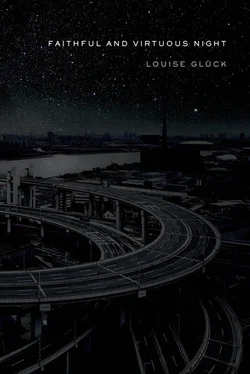Let me tell you something, said the old woman.
We were sitting, facing each other,
in the park at ____, a city famous for its wooden toys.
At the time, I had run away from a sad love affair,
and as a kind of penance or self-punishment, I was working
at a factory, carving by hand the tiny hands and feet.
The park was my consolation, particularly in the quiet hours
after sunset, when it was often abandoned.
But on this evening, when I entered what was called the Contessa’s Garden,
I saw that someone had preceded me. It strikes me now
I could have gone ahead, but I had been
set on this destination; all day I had been thinking of the cherry trees
with which the glade was planted, whose time of blossoming had nearly ended.
We sat in silence. Dusk was falling,
and with it came a feeling of enclosure
as in a train cabin.
When I was young, she said, I liked walking the garden path at twilight
and if the path was long enough I would see the moon rise.
That was for me the great pleasure: not sex, not food, not worldly amusement.
I preferred the moon’s rising, and sometimes I would hear,
at the same moment, the sublime notes of the final ensemble
of The Marriage of Figaro . Where did the music come from?
I never knew.
Because it is the nature of garden paths
to be circular, each night, after my wanderings,
I would find myself at my front door, staring at it,
barely able to make out, in darkness, the glittering knob.
It was, she said, a great discovery, albeit my real life.
But certain nights, she said, the moon was barely visible through the clouds
and the music never started. A night of pure discouragement.
And still the next night I would begin again, and often all would be well.
I could think of nothing to say. This story, so pointless as I write it out,
was in fact interrupted at every stage with trance-like pauses
and prolonged intermissions, so that by this time night had started.
Ah the capacious night, the night
so eager to accommodate strange perceptions. I felt that some important secret
was about to be entrusted to me, as a torch is passed
from one hand to another in a relay.
My sincere apologies, she said.
I had mistaken you for one of my friends.
And she gestured toward the statues we sat among,
heroic men, self-sacrificing saintly women
holding granite babies to their breasts.
Not changeable, she said, like human beings.
I gave up on them, she said.
But I never lost my taste for circular voyages.
Correct me if I’m wrong.
Above our heads, the cherry blossoms had begun
to loosen in the night sky, or maybe the stars were drifting,
drifting and falling apart, and where they landed
new worlds would form.
Soon afterward I returned to my native city
and was reunited with my former lover.
And yet increasingly my mind returned to this incident,
studying it from all perspectives, each year more intensely convinced,
despite the absence of evidence, that it contained some secret.
I concluded finally that whatever message there might have been
was not contained in speech — so, I realized, my mother used to speak to me,
her sharply worded silences cautioning me and chastising me—
and it seemed to me I had not only returned to my lover
but was now returning to the Contessa’s Garden
in which the cherry trees were still blooming
like a pilgrim seeking expiation and forgiveness,
so I assumed there would be, at some point,
a door with a glittering knob,
but when this would happen and where I had no idea.
1.
Sometime after I had entered
that time of life
people prefer to allude to in others
but not in themselves, in the middle of the night
the phone rang. It rang and rang
as though the world needed me,
though really it was the reverse.
I lay in bed, trying to analyze
the ring. It had
my mother’s persistence and my father’s
pained embarrassment.
When I picked it up, the line was dead.
Or was the phone working and the caller dead?
Or was it not the phone, but the door perhaps?
2.
My mother and father stood in the cold
on the front steps. My mother stared at me,
a daughter, a fellow female.
You never think of us, she said.
We read your books when they reach heaven.
Hardly a mention of us anymore, hardly a mention of your sister.
And they pointed to my dead sister, a complete stranger,
tightly wrapped in my mother’s arms.
But for us, she said, you wouldn’t exist.
And your sister — you have your sister’s soul.
After which they vanished, like Mormon missionaries.
3.
The street was white again,
all the bushes covered with heavy snow
and the trees glittering, encased with ice.
I lay in the dark, waiting for the night to end.
It seemed the longest night I had ever known,
longer than the night I was born.
I write about you all the time, I said aloud.
Every time I say “I,” it refers to you.
4.
Outside the street was silent.
The receiver lay on its side among the tangled sheets;
its peevish throbbing had ceased some hours before.
I left it as it was,
its long cord drifting under the furniture.
I watched the snow falling,
not so much obscuring things
as making them seem larger than they were.
Who would call in the middle of the night?
Trouble calls, despair calls.
Joy is sleeping like a baby.
You’re stepping on your father, my mother said,
and indeed I was standing exactly in the center
of a bed of grass, mown so neatly it could have been
my father’s grave, although there was no stone saying so.
You’re stepping on your father, she repeated,
louder this time, which began to be strange to me,
since she was dead herself; even the doctor had admitted it.
I moved slightly to the side, to where
my father ended and my mother began.
The cemetery was silent. Wind blew through the trees;
I could hear, very faintly, sounds of weeping several rows away,
and beyond that, a dog wailing.
At length these sounds abated. It crossed my mind
I had no memory of being driven here,
to what now seemed a cemetery, though it could have been
a cemetery in my mind only; perhaps it was a park, or if not a park,
a garden or bower, perfumed, I now realized, with the scent of roses—
douceur de vivre filling the air, the sweetness of living,
as the saying goes. At some point,
it occurred to me I was alone.
Where had the others gone,
my cousins and sister, Caitlin and Abigail?
By now the light was fading. Where was the car
waiting to take us home?
I then began seeking for some alternative. I felt
an impatience growing in me, approaching, I would say, anxiety.
Finally, in the distance, I made out a small train,
stopped, it seemed, behind some foliage, the conductor
lingering against a doorframe, smoking a cigarette.
Do not forget me, I cried, running now
over many plots, many mothers and fathers—
Do not forget me, I cried, when at last I reached him.
Madam, he said, pointing to the tracks,
surely you realize this is the end, the tracks do not go farther.
His words were harsh, and yet his eyes were kind;
this encouraged me to press my case harder.
Читать дальше












